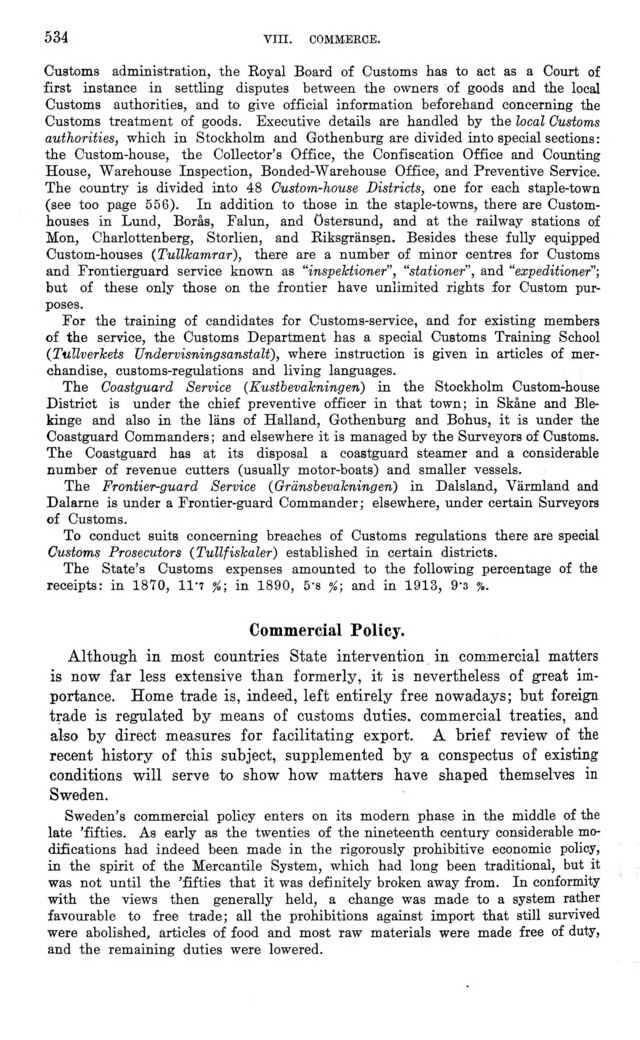
Full resolution (JPEG) - On this page / på denna sida - VIII. Commerce. [By A. Berencreutz] - Customs-Tariff Legislation and Custom-House Establishments. By K. G. Wetterlund - Commercial Policy. By S. Brisman

<< prev. page << föreg. sida << >> nästa sida >> next page >>
Below is the raw OCR text
from the above scanned image.
Do you see an error? Proofread the page now!
Här nedan syns maskintolkade texten från faksimilbilden ovan.
Ser du något fel? Korrekturläs sidan nu!
This page has never been proofread. / Denna sida har aldrig korrekturlästs.
534
viii. commerce.
Customs administration, the Royal Board of Customs has to act as a Court of
first instance in settling disputes between the owners of goods and the local
Customs authorities, and to give official information beforehand concerning the
Customs treatment of goods. Executive details are handled by the local Customs
authorities, which in Stockholm and Gothenburg are divided into special sections:
the Custom-house, the Collector’s Office, the Confiscation Office and Counting
House, Warehouse Inspection, Bonded-Warehouse Office, and Preventive Service.
The country is divided into 48 Custom-house Districts, one for each staple-town
(see too page 556). In addition to those in the staple-towns, there are
Customhouses in Lund, Borås, Falun, and Östersund, and at the railway stations of
Mon, Charlottenberg, Storlien, and Riksgränsen. Besides these fully equipped
Custom-houses (Tullkamrar), there are a number of minor centres for Customs
and Frontierguard service known as "inspektioner", "stationer", and "expeditioner";
but of these only those on the frontier have unlimited rights for Custom
purposes.
For the training of candidates for Customs-service, and for existing members
of the service, the Customs Department has a special Customs Training School
(Tullverkets Undervisningsanstalt), where instruction is given in articles of
merchandise, customs-regulations and living languages.
The Coastguard Service (Kustbevakningen) in the Stockholm Custom-house
District is under the chief preventive officer in that town; in Skåne and
Blekinge and also in the läns of Halland, Gothenburg and Bohus, it is under the
Coastguard Commanders; and elsewhere it is managed by the Surveyors of Customs.
The Coastguard has at its disposal a coastguard steamer and a considerable
number of revenue cutters (usually motor-boats) and smaller vessels.
The Frontier-guard Service (Gränsbevakningen) in Dalsland, Värmland and
Dalarne is under a Frontier-guard Commander; elsewhere, under certain Surveyors
of Customs.
To conduct suits concerning breaches of Customs regulations there are special
Customs Prosecutors (Tullfiskaler) established in certain districts.
The State’s Customs expenses amounted to the following percentage of the
receipts: in 1870, 11*7 %; in 1890, 5s and in 1913, 9"S %.
Commercial Policy.
Although in most countries State intervention in commercial matters
is now far less extensive than formerly, it is nevertheless of great
importance. Home trade is, indeed, left entirely free nowadays; but foreign
trade is regulated by means of customs duties, commercial treaties, and
also by direct measures for facilitating export. A brief review of the
recent history of this subject, supplemented by a conspectus of existing
conditions will serve to show how matters have shaped themselves in
Sweden.
Sweden’s commercial policy enters on its modern phase in the middle of the
låte ’fifties. As early as the twenties of the nineteenth century considerable
modifications had indeed been made in the rigorously prohibitive economic policy,
in the spirit of the Mercantile System, which had long been traditional, but it
was not until the ’fifties that it was definitely broken away from. In conformity
with the views then generally held, a change was made to a system rather
favourable to free trade; all the prohibitions against import that still survived
were abolished, articles of food and most raw materials were made free of duty,
and the remaining duties were lowered.
<< prev. page << föreg. sida << >> nästa sida >> next page >>